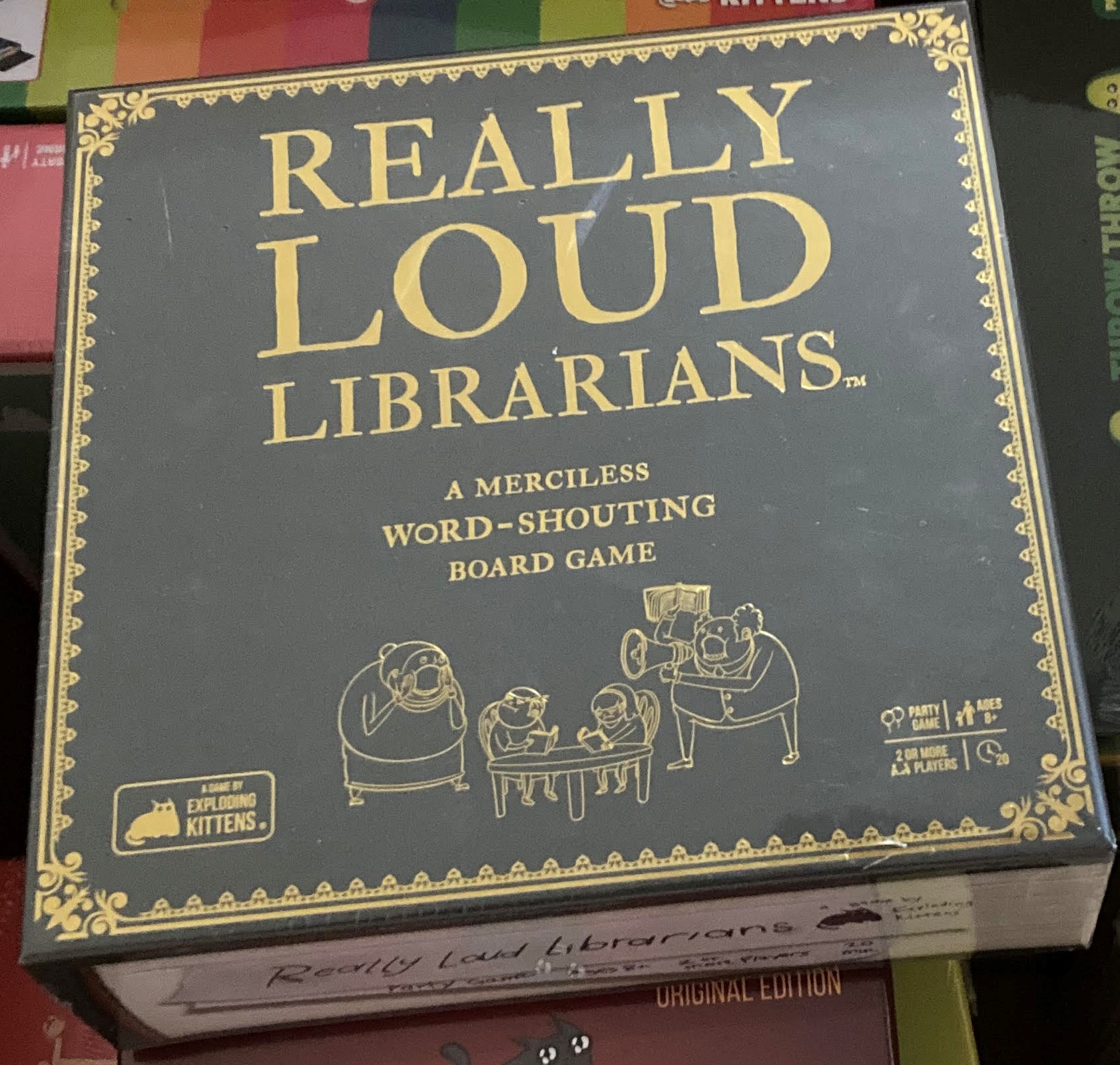Board gaming clubs and events circa 1995 were often a half a dozen kids gathered around an Axis and Allies™ board. I remember these events well. While those gathered were typically my friends, and I enjoyed the social time, I was never a great fan of Axis and Allies™. Aside from never being very good at it, the tediousness of moving the pieces and spending four-ish hours playing just to end up losing was never something I particularly looked forward to doing.
 Board games, clubs and events have come a long way since then, and now many libraries are getting into collecting, lending, programming and promoting with games. In these uncertain times, it’s my hope that board games in libraries don’t suffer. I feel, as I shared in a webinar last year, that they can be a subtle and powerful tool to help players to learn and improve on many of the soft skills that employers covet in new hires. Throughout the history of the profession, public libraries have made materials available to all they serve. As a material type that can be a bit pricey – and where every game does not meet every player’s needs – libraries are uniquely positioned to help introduce games to a wider audience, while helping people find something they can enjoy. At the same time, we are helping improve the employability of those players. Currently, I am unsure when we will be able to get back to using our collections in these ways, so what better time to plan than now?
Board games, clubs and events have come a long way since then, and now many libraries are getting into collecting, lending, programming and promoting with games. In these uncertain times, it’s my hope that board games in libraries don’t suffer. I feel, as I shared in a webinar last year, that they can be a subtle and powerful tool to help players to learn and improve on many of the soft skills that employers covet in new hires. Throughout the history of the profession, public libraries have made materials available to all they serve. As a material type that can be a bit pricey – and where every game does not meet every player’s needs – libraries are uniquely positioned to help introduce games to a wider audience, while helping people find something they can enjoy. At the same time, we are helping improve the employability of those players. Currently, I am unsure when we will be able to get back to using our collections in these ways, so what better time to plan than now?
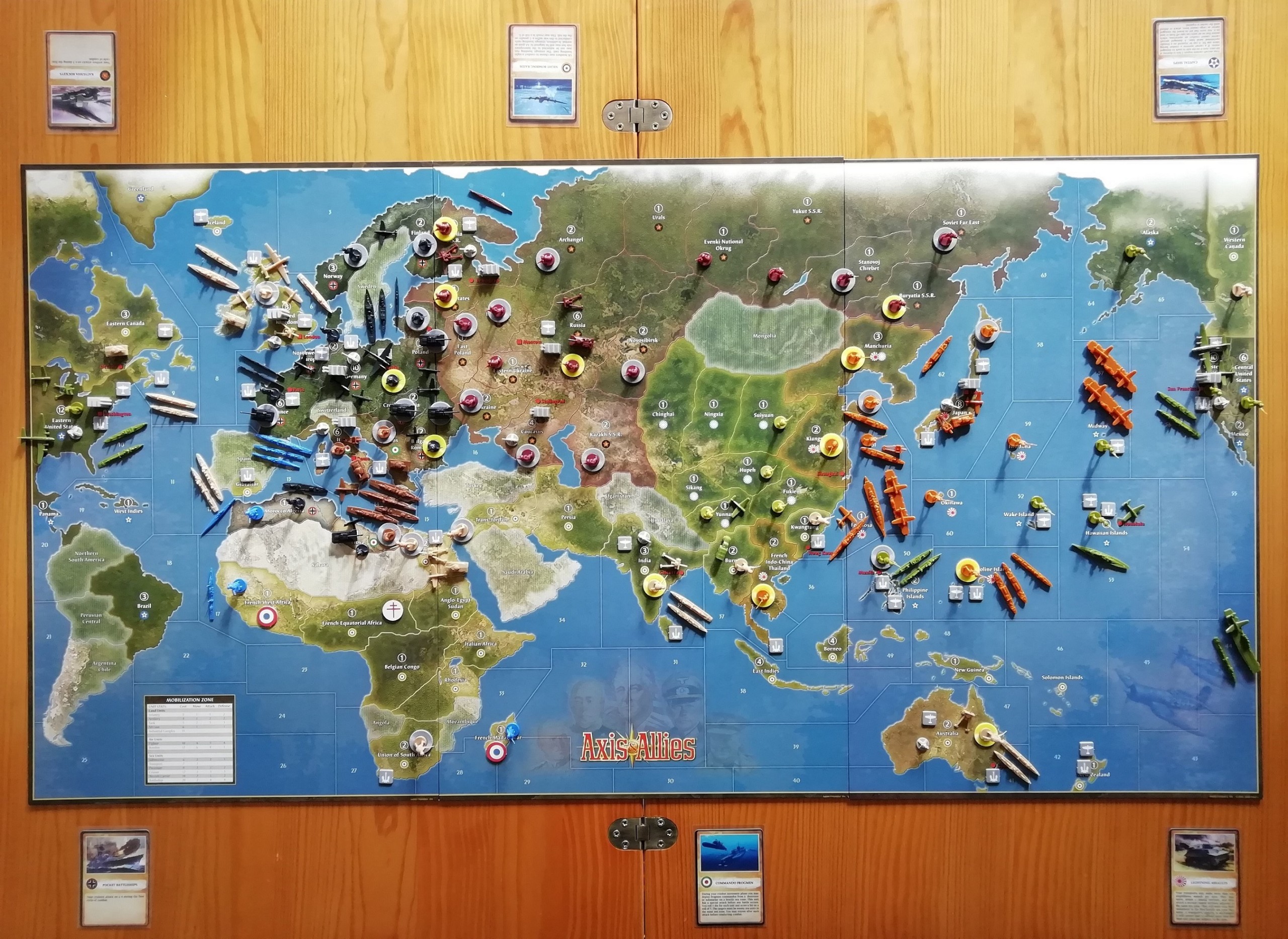 At a recent Indiana State Library update meeting, Director of Statewide Services Wendy Knapp shared some insights into Amy Webb’s “axes of uncertainty” method for planning for the future as explained Webb’s article “How Futurists Cope with Uncertainty.” While I myself am still digesting this method, I thought it might be fun to try it in relation to my fear – losing support for board games in libraries – and see how we, as a profession, might prepare.
At a recent Indiana State Library update meeting, Director of Statewide Services Wendy Knapp shared some insights into Amy Webb’s “axes of uncertainty” method for planning for the future as explained Webb’s article “How Futurists Cope with Uncertainty.” While I myself am still digesting this method, I thought it might be fun to try it in relation to my fear – losing support for board games in libraries – and see how we, as a profession, might prepare.
First, what is the fear and uncertainty? Libraries will cut back on, or eliminate, board games from their collections.
Next, what is the opposite of that fear? Libraries will not cut back on, or eliminate, board games from their collections.
To continue the model, a second fear or uncertainty is needed. Here, I’ll use the example from Wendy’s presentation: People will continue social distancing.
Finally, the opposite of the second fear: People will return to libraries in droves.
Here is what we get:
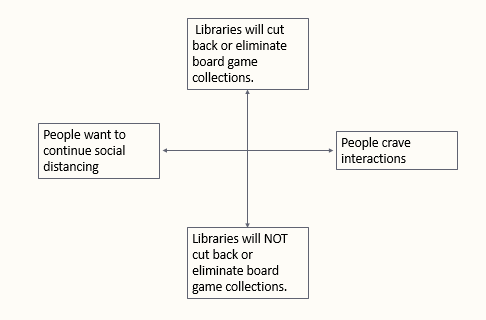 Now we have a grid, or a continuum of possibilities, for these two uncertainties. We just need to figure out how to plan for the four basic quadrant outcomes. Basically, we would plan for the extremes for each possible combination. As an example, if budgets get tight and community pressure builds for libraries to cut back, it seems logical that board game collections wouldn’t grow if you have them, or they wouldn’t get started if you don’t have them. While I would personally love for this to not be the case, it’s a reasonable outcome. If that outcome was paired with continued social distancing, those lucky enough to have an assemblage of games could increase collection promotion to aid circulation, which would be a positive way to combat the negative community pressures. If you don’t already have a collection, then beginning to lay the ground work for the positive outcomes of a possible future collection might be the best use of time and effort.
Now we have a grid, or a continuum of possibilities, for these two uncertainties. We just need to figure out how to plan for the four basic quadrant outcomes. Basically, we would plan for the extremes for each possible combination. As an example, if budgets get tight and community pressure builds for libraries to cut back, it seems logical that board game collections wouldn’t grow if you have them, or they wouldn’t get started if you don’t have them. While I would personally love for this to not be the case, it’s a reasonable outcome. If that outcome was paired with continued social distancing, those lucky enough to have an assemblage of games could increase collection promotion to aid circulation, which would be a positive way to combat the negative community pressures. If you don’t already have a collection, then beginning to lay the ground work for the positive outcomes of a possible future collection might be the best use of time and effort.
The top half of the matrix – the fiscal pressure side – suggests that people will return in droves. Planning for this might be trickier, but I would consider focusing on circulation or focusing on games that require less synchronous action around a table. I would also focus less on game nights and programs and more on collecting your players’ stories that could be shared with non-players. A community bulletin board – either physical or virtual – to promote the games could be a great idea.
I would love to be in a situation where the bottom half of the matrix is closer to reality and libraries don’t cut back or eliminate board games – and maybe even invest more. One can dream. In this situation, if my community was continuing to social distance, I would look at creating materials about games, gaming and the collection. Maybe create a site to teach the community how to game online, or create marketing materials about existing services around games and gaming. The other extreme is that the people come back and libraries get to keep the collection strong. Here, possibly even more than the social distancing side of the lower half, I would look at ways to promote safe gaming. Maybe increase the number of games to better facilitate circulation or host virtual game discussion groups if you are able.
Here is what my final matrix might look like. Yours, I’m sure, will be different:
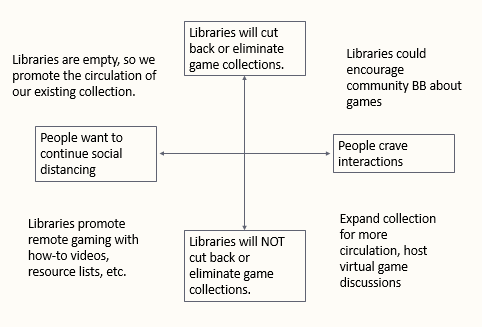 This method of planning for uncertainty was helpful to me and has gotten me thinking about games in libraries, especially here in Indiana. As some of you may know, there was a question on this past year’s annual survey to indicate if your library has board games in the collection. It may be a while before I can fully look at that data, but I do know that I want to begin curating more resources to support the libraries in Indiana. If anyone would be interested in a virtual round table for games and gaming in libraries, let me know. My email address can be found below.
This method of planning for uncertainty was helpful to me and has gotten me thinking about games in libraries, especially here in Indiana. As some of you may know, there was a question on this past year’s annual survey to indicate if your library has board games in the collection. It may be a while before I can fully look at that data, but I do know that I want to begin curating more resources to support the libraries in Indiana. If anyone would be interested in a virtual round table for games and gaming in libraries, let me know. My email address can be found below.
This post was written by George Bergstrom, Southwest regional coordinator, Professional Development Office, Indiana State Library.
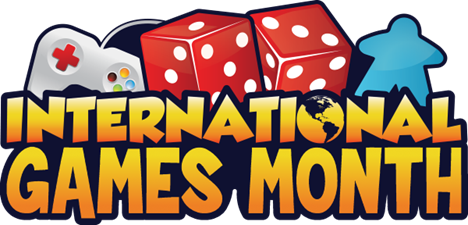 What is IGM? Well, it is a celebration of games and gaming in libraries. GameRT encourages libraries to play, talk about, teach, promote and even create games during November each year. We work to connect libraries and their patrons with free resources that can found on our website. We also strive to get sponsors to give games away to libraries. While the deadline has passed to be registered for the giveaways of physical games, there is still time to register for the drawings of discount codes from some of our sponsors. If you are interested in registering, you can use the following form.
What is IGM? Well, it is a celebration of games and gaming in libraries. GameRT encourages libraries to play, talk about, teach, promote and even create games during November each year. We work to connect libraries and their patrons with free resources that can found on our website. We also strive to get sponsors to give games away to libraries. While the deadline has passed to be registered for the giveaways of physical games, there is still time to register for the drawings of discount codes from some of our sponsors. If you are interested in registering, you can use the following form.
